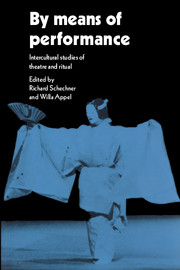Book contents
- Frontmatter
- Contents
- List of figures
- Notes on contributors
- Concerning Victor Turner
- Introduction
- 1 Are there universals of performance in myth, ritual, and drama?
- 2 Magnitudes of performance
- 3 Liminality: a synthesis of subjective and objective experience
- 4 The Yaqui deer dance at Pascua Pueblo, Arizona
- 5 A Yaqui point of view: on Yaqui ceremonies and anthropologists
- 6 Performance of precepts/precepts of performance: Hasidic celebrations of Purim in Brooklyn
- 7 The significance of performance for its audience: an analysis of three Sri Lankan rituals
- 8 What does it mean to “become the character”: power, presence, and transcendence in Asian in-body disciplines of practice
- 9 Korean shamans: role playing through trance possession
- 10 The practice of noh theatre
- 11 The profanation of the sacred in circus clown performances
- 12 Ethnographic notes on sacred and profane performance
- 13 The spatial sense of the sacred in Spanish America and the American South and its tie with performance
- 14 Space and context
- 15 The transformation of consciousness in ritual performances: some thoughts and questions
- 16 Universals of performance; or amortizing play
- Appendix
- Bibliography
- Index
16 - Universals of performance; or amortizing play
Published online by Cambridge University Press: 05 June 2012
- Frontmatter
- Contents
- List of figures
- Notes on contributors
- Concerning Victor Turner
- Introduction
- 1 Are there universals of performance in myth, ritual, and drama?
- 2 Magnitudes of performance
- 3 Liminality: a synthesis of subjective and objective experience
- 4 The Yaqui deer dance at Pascua Pueblo, Arizona
- 5 A Yaqui point of view: on Yaqui ceremonies and anthropologists
- 6 Performance of precepts/precepts of performance: Hasidic celebrations of Purim in Brooklyn
- 7 The significance of performance for its audience: an analysis of three Sri Lankan rituals
- 8 What does it mean to “become the character”: power, presence, and transcendence in Asian in-body disciplines of practice
- 9 Korean shamans: role playing through trance possession
- 10 The practice of noh theatre
- 11 The profanation of the sacred in circus clown performances
- 12 Ethnographic notes on sacred and profane performance
- 13 The spatial sense of the sacred in Spanish America and the American South and its tie with performance
- 14 Space and context
- 15 The transformation of consciousness in ritual performances: some thoughts and questions
- 16 Universals of performance; or amortizing play
- Appendix
- Bibliography
- Index
Summary
Henry James, whose struggle with the theatre left performative traces in the consciousness of his prose, wrote succinctly in one of his prefaces of the drama as an ado. There is in the brevity of the word an almost molecular view of performance, like the Freudian fort/da, the child's game of disappearance and return, played with a spool, in which by the repetitive deferral of pleasure the reality principle is enjoyed. According to Freud, the disappearance which is being performed is the departure of the child's mother. The fort/da is an ado which pivots on an absence. We know from Shakespeare that it is possible to make, in theatre, much ado about nothing; and we know from Beckett, and Zeami, that it is possible to perform the seeming absence of an ado as a precise nothing to be done.
Nothing may come of nothing, but it would also be precise to think of that replicated nothing as a substantive ado. For there is a crucial particle of difference – especially where nothing is concerned – between that and just doing, between just breathing eating sleeping loving and performing those functions of just living; that is, with more or less deliberation, doing the act of breathing, eating, sleeping, loving, like Didi/Gogo do the tree in Godot. It is a difference as distinct as the presence or absence of punctuation in the previous sentence.
- Type
- Chapter
- Information
- By Means of PerformanceIntercultural Studies of Theatre and Ritual, pp. 250 - 272Publisher: Cambridge University PressPrint publication year: 1990
- 6
- Cited by



